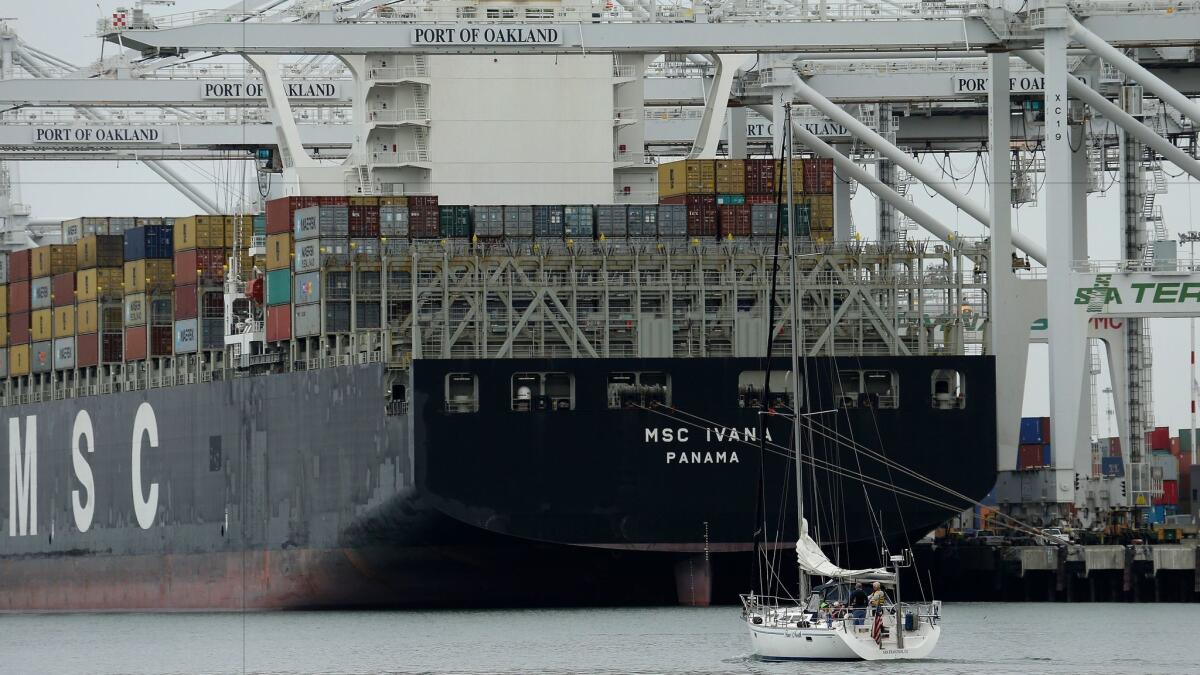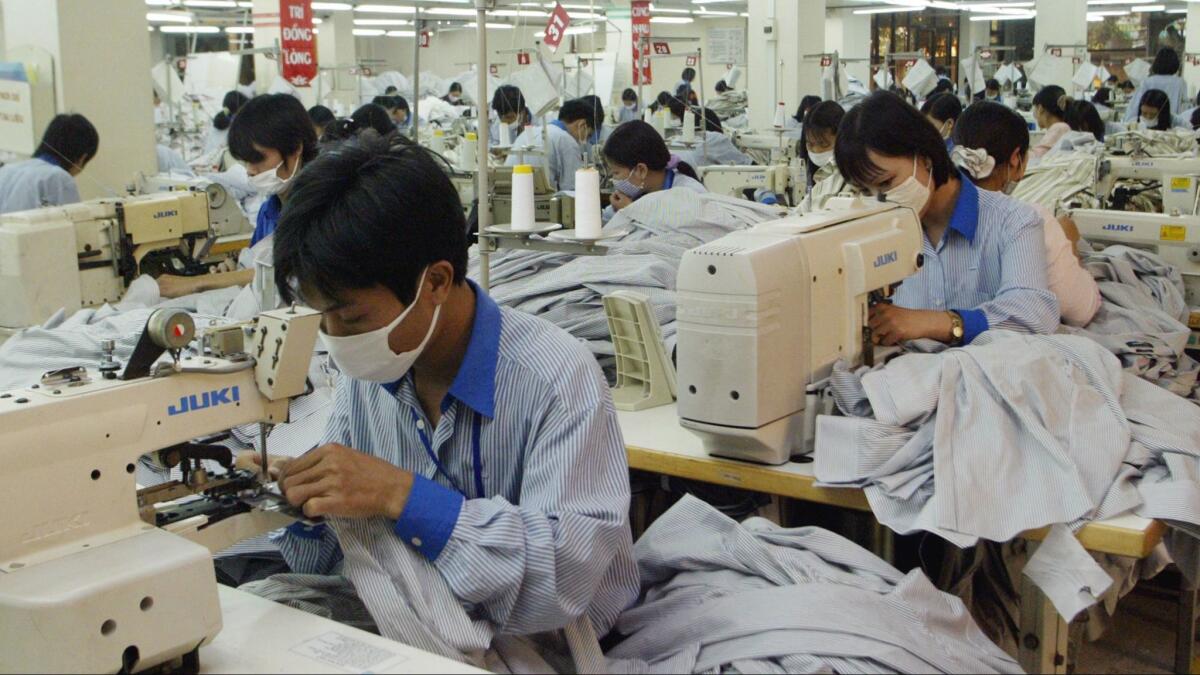Q&A: Why the Obama administration thinks the Trans-Pacific Partnership is a good deal
- Share via
It is billed as President Obama’s signature trade deal — a 12-nation pact that would relax tariffs among the participating countries and set higher standards for hours and wages, working conditions and environmental protection, among other provisions.
But the future of the Trans-Pacific Partnership, almost six years in the making, continues to face opposition and is yet to be ratified by U.S. lawmakers. Critics reject the argument that it would create jobs, defend the environment and guard against harmful imports. Union leaders fear that U.S. manufacturing and service jobs would be outsourced to low-wage countries, such as Vietnam. Presidential candidates Hillary Clinton and Donald Trump have both assailed the deal and promised to kill it if elected to the White House.
Administration officials have suggested that the agreement could still be pushed through after the election, during the lame-duck session. If that fails, the incoming president could return to the drawing board or eliminate it all together.
That would not only be detrimental to the interests of U.S. workers and companies, the agreement’s supporters say, it could also undermine America’s influence in Asia and leadership around the world.
U.S. Secretary of Commerce Penny Pritzker touched on these views during a recent interview with The Times.
Her comments have been edited for length and clarity.
Why undertake the Trans-Pacific Partnership?
There’s an economic benefit to us. There’s a national security aspect to this, and there’s a U.S. leadership aspect. TPP is an agreement that the United States has really been leading and if we don’t finish it, why are these countries going to continue to engage with us in the same way?

From a strategic or military standpoint, the U.S. presence in the Asia-Pacific region is more than just a military presence, it’s also by virtue of having greater economic presence. When we have greater economic presence, we have a greater interest in free flow of goods through the seas or protecting territorial integrity. So it creates a greater stability in the region. If we’re knit closer together and we’re helping other countries grow as well … it also means that they’re less likely to have violent extremism.
And in my mind the most important reason and the reason I think is good for American workers and good for American businesses [is that] TPP gives market access we don’t have today. It gives us market access in the fastest-growing region in the world. It eliminates tariffs and trade barriers that are a problem today — whether it’s the 70% tariff on the cars that we make in America, or it’s the 40% tariffs in Japan on our poultry. Those go away. And it reduces red tape. It makes it easier to sell your goods.
I think the other thing not to forget is that the competition is not standing still. These countries have free trade agreements with China where they don’t have the kind of tariffs that we’ve got. They’re also being asked to join other multilateral trade agreements, ones where the rules are being shaped more by China, where there isn’t a higher labor standard, there isn’t a high environmental standard, there isn’t the kind of digital freedom that we rely upon for greater economic growth.

How does the Regional Cooperation on Economic Partnership agreement led by China threaten or rival TPP?
The 12 countries that have agreed to TPP have agreed to 21st century standards for trade. The other thing they’ve also agreed to is enforcement. And let’s not forget, enforcement is an important part of this TPP — the ability to make sure all of these countries are going to live up to these standards and agreements that we’ve set. We’re doing more trade enforcement than we’ve ever done. But if we don’t have these agreements in place then trade will be done without the protections that exist in TPP and therefore we’ll have to compete as American companies facing high tariffs and no labor protections and no environmental protection.
Is America’s global leadership role at stake if TPP does not pass?
This is a deal with 11 other countries. Each of those countries made compromises in order to try and create a higher standard of trade rules among the 12 countries. If you’re a country that’s agreeing to labor standards that you don’t have today — higher minimum wage or international labor standards, or environmental standards or greater access or freedom in terms of digital flows, or allowing access of our agricultural product — and then you convince your population to accept those rules, and then the United States that has been the impetus for this agreement doesn’t follow through to bring the agreement to conclusion … those leaders put themselves in a vulnerable position or put themselves in a position where they’re going to have to look around and say, “Who are my partners? Who can I rely on?”
How do you address the anxiety over the TPP?
The anxiety we’re seeing in our country should not be ignored. I think the cause of this anxiety is not trade. Only 5% of consumers in the world are in the United States. We have to sell our goods all over the world — 11.6 million jobs in America depend on our ability to export. Our ability to export depends on our ability to have market access.
I think the anxiety that’s being felt in America is a result of globalization. People realize we are competing against companies from other parts of the world. But … you want to compete on a level playing field. You want the right for American workers not to be at a disadvantage, for American companies not to be at a disadvantage.
The other part of the anxiety is because of automation and digitization. That’s why the president has been so focused on workforce training, on increasing the number of apprenticeships, on greater digital coding and training that’s going on in our schools, on the opportunities of advanced manufacturing … and the access for every American to education that’s affordable, if not free, in the community colleges.
So there is anxiety. But not trading is not going to solve that anxiety. Not trading will create more anxiety because it will create less opportunity for American workers and American businesses and our economy will hurt.
Why is that message not getting across?
I don’t know why, but I think trade has been used as a code word to speak to people’s anxieties. But when you really think about what trade is, it’s an opportunity for America. It’s not a detriment to America and I think particularly with this agreement, which is a much higher standard, much greater enforcement provisions than any free trade agreement that we’ve done.
What kind of impact is the increasingly protectionist rhetoric of the presidential campaign having on potential foreign investors?
We’ve been really focused in our department, with the president’s direction and blessing, on attracting greater foreign direct investment and the reason is because, first of all, it’s good for the American worker. Twelve million Americans go to work at American subsidiaries of foreign companies and those companies export $360 billion of goods and services from the United States, so we’re working really hard to take advantage of what foreign companies see as the United States being a good place to invest. And what we shouldn’t do is undermine that. We shouldn’t undermine it by being insular.
What foreign companies see in the United States is strong rule of law. They see great research and development going on. They see an extraordinary workforce. And [the global management consulting firm] A.T. Kearney, I think for the fourth year in a row, has said that this is the No. 1 place to invest in the world. And that’s good for our economy.
We want our economy to continue to grow. Those companies create good jobs. They tend to create higher-paying jobs than the average job in America. So we want that. That’s good. We’ve worked really hard as this administration to continue to grow that interest.
For more on global development news, see our Global Development Watch page, and follow me @AMSimmons1 on Twitter
More to Read
Sign up for Essential California
The most important California stories and recommendations in your inbox every morning.
You may occasionally receive promotional content from the Los Angeles Times.














